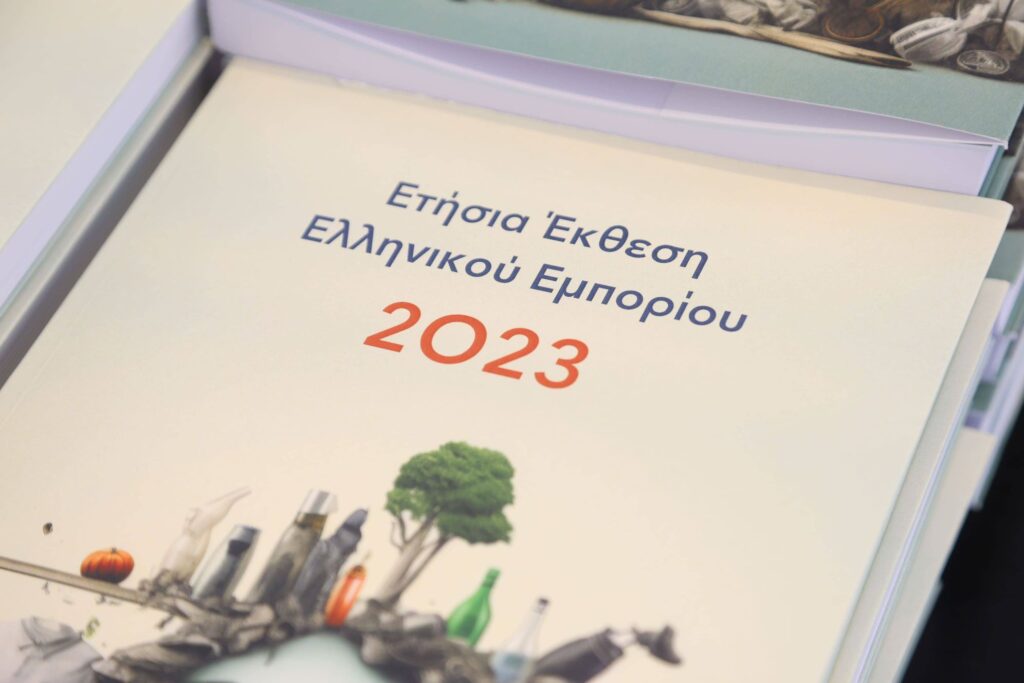
The Annual Report of Greek Commerce 2023 was presented today, February 26, 2024, by ESEE, highlighting the sector’s important role in the Greek economy in terms of employment and Gross Added Value. The Annual Report of Greek Commerce 2023 maps the transformations that the commerce ecosystem is undergoing by presenting the challenges that commercial enterprises are called to face.
The Annual Report of Greek Commerce for 2023 confirms, for another year, that the commerce sector, with a turnover exceeding 169.4 billion euros and in which more than 227,000 companies are active, is also the largest employer in the Greek economy, employing 700,000 people. However, employment for 2023 records a decrease of 3.5% compared to 2022 due to the reduction of jobs in all individual sectors, with the highest recorded in the automotive industry (19.4%). Of course, in retail commerce, there is a boost in salaried employment (2.5% compared to 2022). The increase of (DKE) in retail commerce (3.2%) records fatigue, which is due, to a large extent, to the inflationary escalation.
The contraction in the commerce sector is hurting the performance of smaller firms, which appear to be trapped in a state of ‘stagnation-cage.’ As it emerges from INEMY’s primary research, the smaller businesses comprising the vast majority of commercial companies may demonstrate significant resilience. Still, they seem trapped in the low performance of successive crises.
According to data from the Annual Report, the main challenges faced by commercial enterprises continue to be: a) the management of revaluations (6 out of 7), b) financial obligations (5.9 out of 7), and c) liquidity (5,2 out of 7). The energy crisis hurts the operation of commercial enterprises, as 85.7% of commercial enterprises’ turnover has been negatively affected by price increases in energy costs. In comparison, 23% of commercial enterprises face increases of 21-30% in energy costs. Stagnant performance combined with inflationary escalation forces commercial enterprises to prioritize short-term sustainability over their long-term twin transformation.
The scientific presentation of E – 2023 was made by:
Dr. Charalambos Arachovas, Economist – Coordinator of the Economic Analysis Department ESEE
Dr. Manolis Manioudis, Financial Analyst INEMY-ESEE
The President of ESEE, Mr. Giorgos Karanikas, emphasized:
“The results of the EEEE-2023 highlight, once again, the central role of the commerce sector in the Greek economy. A special position continues to be held by small commercial enterprises, which, after successive crises, seem to be trapped in a “state of stagnation.” Now, the cost of digital transformation and green transition is not assessed as a priority challenge as the obstacles of the economic and business environment force companies to focus on their short-term sustainability rather than their long-term but necessary transformation. The multi-faceted nature of the findings of the Exhibition will be further explored through the leading ESEE Conference, “Future of Retail,” next April.”
This was followed by a fascinating discussion on the Report’s findings, which were reported by Ms. Valia Aranitou, Scientific Director, INEMY-ESEE, Associate Professor of the National and Kapodistrian University of Athens. Ms. Lena Tsipouri, professor emeritus of the National and Kapodistrian University of Athens and Mr. Panagiotis Liargovas, President of KEPE and Professor at the University of Peloponnese and President of the Department of Economic Sciences, and Lois Lambrianidis, Professor (retired) PA.MAK participated in the discussion. And former Secretary General of Private Investments, Ministry of Economy & Development.
Mrs. Tsipouri focused on the employment problem, stressing that it is international and directly connected to the digital transition and that those employed in retail commerce should be retrained. He also stated that small and medium enterprises are not allowed to focus on essential issues (e.g., green transition) because they are devoted to every day and more immediate problems. In addition, he emphasized that the state should help the digital transition with financial tools.
Mr. Lambrianidis emphasized that despite the positive elements of economic figures, such as the increase in the minimum wage, the reduction of unemployment, and the level of investment, the economy is not flourishing. He argued that if the country does not change its development model, commerce cannot develop. He underlined that the policies implemented are decisive and must aim to combat cartels and oligopolistic policies.
Liargovas noted that the labor market has a severe problem due to the digital transition, as there is no specialized workforce, mainly in the private sector, where the economic indicators are shallow (at lower levels than the public sector). He also emphasized that the green transition is expensive for small and medium enterprises and that there are insufficient financial tools. Finally, he said that structures and reforms are needed in the structural sector. At the same time, he concluded that we need more expensive wage labor, which will be based on production, investment, and commerce.
Ms. Aranitou stated that she was pleased to note the acceptance of the Annual Greek Commerce Exhibition by society and institutional bodies. The findings of this year’s annual Report are a “danger bell” about the concentration of economic activity in large companies and individual industry sectors, with the priorities of SMEs focused on short-term sustainability rather than long-term transformation. This development widens the distance between larger and smaller businesses and raises concerns about their smooth coexistence. The above intensifies worries about retail commerce’s future, mainly including micro and small commercial enterprises.